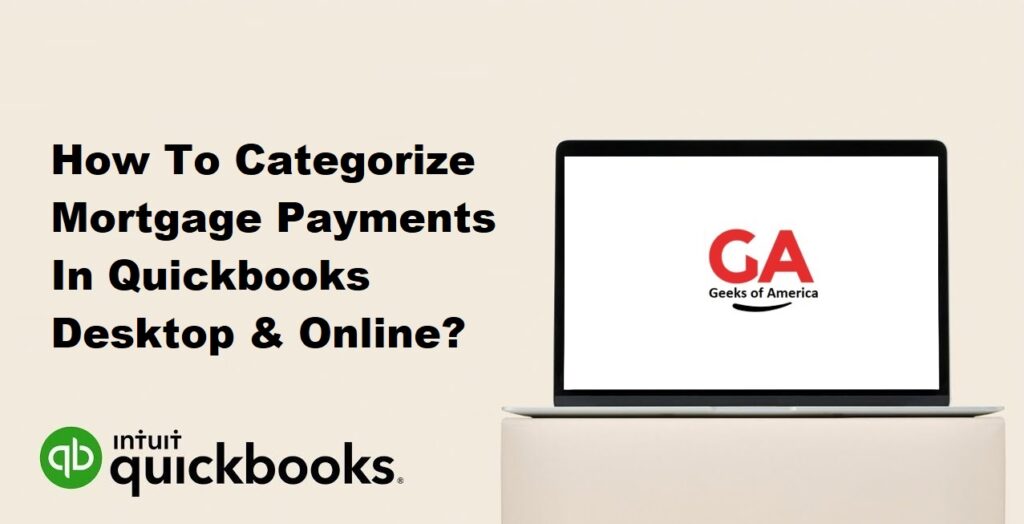Categorizing mortgage payments accurately in QuickBooks Desktop and QuickBooks Online is essential for maintaining organized financial records and tracking your mortgage expenses effectively. By properly categorizing mortgage payments, you can analyze your mortgage balances, track interest expenses, and generate insightful reports. In this guide, we will provide you with step-by-step instructions on how to categorize mortgage payments in both QuickBooks Desktop and QuickBooks Online.

Section 1: Understanding Mortgage Payments and Categories
Before categorizing mortgage payments in QuickBooks, it’s important to understand the different components of mortgage payments. Mortgage payments typically consist of two main parts: principal and interest. Principal payments reduce the outstanding mortgage balance, while interest payments represent the cost of borrowing. Properly categorizing these payments ensures accurate financial reporting.
Read Also : How To Record Mortgage Payments In Quickbooks Desktop?
Section 2: Setting up Mortgage Accounts
Step 1: Access Chart of Accounts
In both QuickBooks Desktop and QuickBooks Online, access the “Chart of Accounts” to set up mortgage accounts.
Step 2: Create a Mortgage Account
Click on “New” and select the appropriate account type, such as “Long-term Liability” or “Other Current Liability.” Follow the prompts to enter the necessary details, such as the account name and number.
Read Also : How To Record Mortgage Payments In Quickbooks Online?
Section 3: Creating Expense Accounts
Step 1: Access Chart of Accounts
Navigate to the “Chart of Accounts” in QuickBooks Desktop or QuickBooks Online.
Step 2: Create Expense Accounts
Click on “New” and select the appropriate account type, such as “Expense” or “Other Expense.” Set up separate expense accounts for principal and interest payments, naming them accordingly.
Read Also : How To Categorize Loan Payments In Quickbooks Desktop & Online?
Section 4: Categorizing Mortgage Payments in QuickBooks Desktop
QuickBooks Desktop provides specific account types for mortgage payments. Follow these steps to categorize mortgage payments accurately.
Step 1: Recording Principal Payments
- Access the “Banking” menu and select “Write Checks.”
- Enter the payee name, date, and payment amount.
- In the “Expenses” tab, select the appropriate principal expense account from the “Account” dropdown menu.
- Save the check to record the principal payment.
Step 2: Categorizing Interest Payments
- Access the “Banking” menu and select “Write Checks.”
- Enter the payee name, date, and payment amount.
- In the “Expenses” tab, select the appropriate interest expense account from the “Account” dropdown menu.
- Save the check to record the interest payment.
Read Also : How To Record Loan Payments In Quickbooks Online?
Section 5: Categorizing Mortgage Payments in QuickBooks Online
QuickBooks Online also provides specific options for categorizing mortgage payments. Follow these steps to categorize mortgage payments accurately.
Step 1: Recording Principal Payments
- Access the “Create (+)” menu and select “Expense.”
- Enter the payee name, date, and payment amount.
- Under the “Category” section, select the appropriate principal expense account.
- Save the expense to record the principal payment.
Step 2: Categorizing Interest Payments
- Access the “Create (+)” menu and select “Expense.”
- Enter the payee name, date, and payment amount.
- Under the “Category” section, select the appropriate interest expense account.
- Save the expense to record the interest payment.
Read Also : How To Record Loan Payments In Quickbooks Desktop?
Section 6: Generating Reports on Mortgage Payments
Both QuickBooks Desktop and QuickBooks Online offer various reports to analyze mortgage payments. Some useful reports include:
- Profit & Loss Statement: Provides an overview of interest expenses incurred during a specific period.
- Transaction Detail by Account: Displays a detailed list of mortgage payment transactions, including dates, amounts, and accounts involved.
- Balance Sheet: Shows the outstanding mortgage balance.
Read Also : How To Turn Off Two Factor Authentication Quickbooks Online?
Section 7: Conclusion
Categorizing mortgage payments accurately in QuickBooks Desktop and QuickBooks Online is essential for maintaining organized financial records and analyzing your mortgage expenses effectively. By following the step-by-step instructions provided in this guide, you can ensure that your mortgage payments are correctly categorized, allowing you to track your mortgage obligations and generate insightful reports for informed financial decisions.
